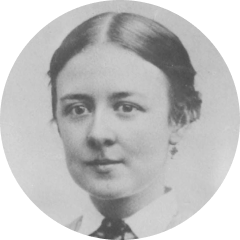Charlotte Champe Stearns Eliot
(1843–1929)
Charlotte Champe Stearns Eliot (1843–1929), the poet’s mother, was born on 22 October 1843 in Baltimore, Maryland, the second child and second daughter of Thomas Stearns (1811–96) and Charlotte Blood Stearns (1818–93). She went first to private schools in Boston and Sandwich, followed by three years at the State Normal School, Framingham, Mass., from which she graduated in 1862. After teaching for a while at private schools in West Chester, Pennsylvania, and Milwaukee, Wisconsin, she spent two years with a Quaker family in Coatesville, Pa. She then taught at Antioch College, Ohio, 1865–7; at her Framingham School; and at St Louis Normal School. It was while she was at the last post that she met Henry Ware Eliot, entrepreneur, whom she married on 27 October 1868. She was Secretary of the Mission Free School of the Church of the Messiah for many years. As her youngest son was growing up, she became more thoroughly involved in social work through the Humanity Club of St Louis, whose members were disturbed by knowing that young offenders awaiting trial were being held for long periods with adults. In 1899, a committee of two was appointed, with Mrs Eliot as chairman, to bring about reform. It was in large part due to her campaigning and persistence over several years that the Probation Law 1901 was approved; and in 1903, by mandate of the Juvenile Court Law, a juvenile court was established with its own probation officer and a separate place of detention.
As a girl, Charlotte had nursed literary ambitions, and throughout her life wrote poems, some of which (such as ‘Easter Songs’ and ‘Poems on the Apostles’) were printed in the Christian Register. In 1904 she published William Greenleaf Eliot: Minister, Educator, Philanthropist, a memoir of her beloved father-in-law (TSE’s grandfather); and it came as a joy to her when TSE arranged for the publication of her Savanarola: A Dramatic Poem, with an introduction by himself (London, 1926). When she was shown the issue of Smith Academy Record containing TSE’s ‘A Lyric’ (1905), she said (as TSE would remember) ‘that she thought it better than anything in verse she had ever written’. TSE reflected on that generous declaration: ‘I knew what her verse meant to her. We did not discuss the matter further.’
Inspired by an ethic of public service, she was a member of both the Wednesday Club of St Louis and the Missouri Society of the Colonial Dames of America, serving successively as Secretary, Vice-President, and President. She chaired a committee to award a Washington University scholarship that required the beneficiary to do a certain amount of patriotic work; and in 1917–18 she did further service as chair of the War Work committee of the Colonial Dames. After the death of her husband in January 1919, she moved home to Cambridge, Massachusetts.
